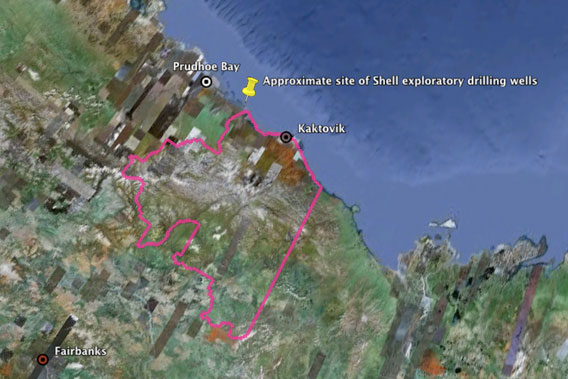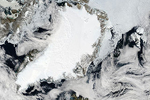
Approximate site of preliminarily approved drilling by Shell. Pink outline is the Arctic National Wildlife Refuge (ANWR). Image made with Google Earth.
Less than a year and a half after the oil spill in the Gulf of Mexico, the Obama administration has bucked warnings from environmentalists to grant preliminary approval to oil giant, Royal Dutch Shell, to drill off the Arctic coast. Exploratory drilling will occur just north of the western edge of the Arctic National Wildlife Refuge (ANWR) in the Beaufort Sea, home to bowhead and beluga whales, seals, walruses, polar bears, and a wide variety of migrating birds.
“This is a disaster waiting to happen,” Holly Harris, an attorney with the environmental group Earthjustice, said in a press release.
Environmentalists and indigenous peoples living in the area have long fought drilling in the US Arctic arguing that extreme conditions make drilling especially precarious and an oil spill would be near-impossible to clean-up adequately. But, the Bureau of Ocean Energy Management, Regulation and Enforcement (BOEMRE) granted permission, pending Shell’s completion of an oil spill response plan.
Admiral Robert Papp, top officer with the US Coast Guard, admitted last month that if a spill occurred in this area, the Coast Guard lacks the infrastructure and equipment needed to deal with a spill.
“If this were to happen off the North Slope of Alaska, we’d have nothing,” said Papp, as reported by Platts. “We’re starting from ground zero today.”
However, Shell has stated that it has ‘the best oil-spill response plan anywhere in the world’, and that it is ready for any problem. The company has already invested more than $3.5 billion to drill in the Arctic ocean. The drill sites in the Beaufort Sea will take place 20 miles off shore in 160 feet deep water, which Shell says would allow divers access to the wells if need be. In the midst of its victory in the Arctic, Shell is expected to pay $1 billion to clean up decades of oil pollution in Nigeria, where a new UN report found that the company did not live up to its own, or the Nigerian government’s, standards. Shell admitted last week to spilling 11 million gallons of oil in Nigeria in 2008.
BOEMRE director Michael Bromwich said the decision to grant Shell approval to drill in the Arctic was based on “the best scientific information available,” but Harris blasted the bureau, saying the regulatory body put ‘oil company profits and power’ over ‘scientific integrity’.
“BOEMRE’s decision to disregard science and gamble with a region that is crucial to endangered bowhead whales, seals, polar bears and other marine wildlife and that Native subsistence communities rely upon so heavily is inexcusable,” she said, adding that, “today’s decision is nothing more than the administration’s decision to roll the dice with the Arctic.”
Arctic oil drilling is also raising eyebrows in Russia. The nation’s first proposed oil drilling in the off-shore Arctic by Gazprom has garnered considerable criticism from environmental groups.
Mikhail Babenko, who heads the World Wildlife Fund’s (WWF) oil and gas Arctic program, told The Moscow Times that Gazprom was not ready for drilling in the Arctic.
Babenko called Gazprom’s $250,000 insurance against environmental damage ‘ridiculous’, given that the clean-up of the BP spill in the Gulf of Mexico cost $40 billion. In addition he noted that the nearest spill cleanup service to Gazprom drilling site is 650 miles (1,000 kilometers) away.
Melting summer ice due to climate change is opening up long closed off areas of the Arctic, and turning the region into an oil and gas free-for-all. However, many environmentalists warn that the melting ice should be seen as a warning of global dependence on fossil fuels and not an opportunity to burn more, thereby worsening the climate change that is overturning fragile Arctic ecosystems.
Related articles
Oil horror in Nigeria: 30 years, one billion dollars to clean-up
(08/08/2011) Fifty years of oil spills in Nigeria’s now infamous Ogoniland region will take up to three decades and over a billion dollars ($1 billion for just the first five years) to restore environments to healthy conditions, according to a new independent report by the United Nations Environment Program (UNEP). The most thorough study to date has found that widespread pollution has hit the Niger Delta even harder than assumed with devastating impacts on fishing grounds and community health. Last week Shell, one of the biggest operators in Nigeria, admitted to two massive oil spills in 2008 totaling 11 million gallons of crude.
Russia and Norway carve up wildlife-rich Arctic sea for fossil fuels
(06/09/2011) As climate change melts the Arctic sea ice, nations are rushing to carve up once-inaccessible areas for oil and gas exploitation, industrial fishing, and shipping routes. Now, BBC reports that Russia and Norway have essentially agreed to split the Arctic’s Barents Sea in half —one of the region’s richest in biodiversity and ecological productivity—for industrial exploitation.
Arctic on the line: oil industry versus Greenpeace at the top of the world

(06/06/2011) At the top of the world sits a lone region of shifting sea ice, bare islands, and strange creatures. For most of human history the Arctic remained inaccessible to all but the hardiest of peoples, keeping it relatively pristine and untouched. But today, the Arctic is arguably changing faster than anywhere else on Earth due to global climate change. Greenhouse gases from society have heated up parts of the Arctic over the past half-century by 4-5 degrees Fahrenheit, leading to a staggering decline in the Arctic sea ice. The large-scale changes suffered by the Arctic have created a new debate over conservation and exploitation, a debate currently represented by the protests of Greenpeace against oil company Cairn Energy, both of whom have been interviewed by mongabay.com (see below).







